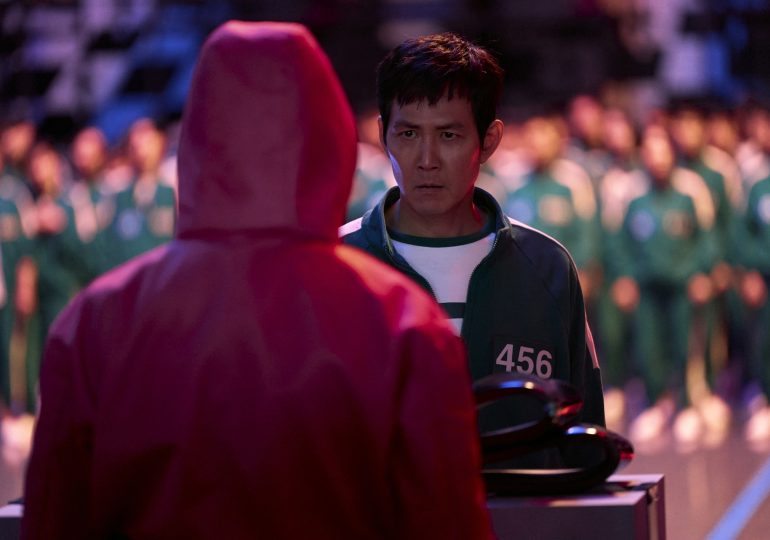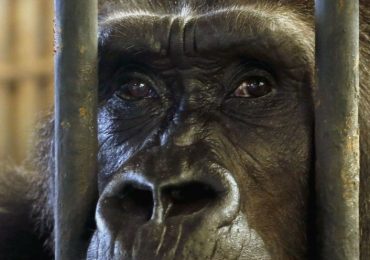Hwang Dong-hyuk has his work cut out for him. There are two more seasons of Squid Game coming up—the second premiering Dec. 26, and the third set for a 2025 release. Creating what has become one of South Korea’s most valuable intellectual properties—a 12-year ordeal in itself—has come at a price, and that’s not just counting the at least eight teeth he lost due to the stress of filming the first season. “I had to write, create and shoot seasons two and three, back to back,” he tells TIME. “Just the sheer physical volume of it all was very intense.”
[time-brightcove not-tgx=”true”]
No one foresaw the runaway success of Squid Game, which was meant to be, like other South Korean dramas, a one-off. But after the 2021 show blew up and caught the attention of audiences worldwide, Netflix and the show’s creator have been working to one-up their initial offering, in hopes of expanding the legacy the series has created.
Creating the cultural phenomenon
To everyone’s surprise, Squid Game ended up as Netflix’s most viewed series to date, going on to win six Emmy awards—including a historic Best Director for Hwang—out of 14 nominations. The show would create almost $900 million in value for the company—more than 40 times the cost of producing the nine-episode dystopian drama. Its success was a testament to Parasite director Bong Joon-ho’s message when he won a Golden Globe for that film just one year before Squid Game’s premiere: people can, indeed, overcome the barrier of subtitles for a promising story.
Even greater than the laurels was Squid Game’s indelible impact on pop culture. Squid Game significantly extended the global demand for Korean entertainment beyond K-pop. The trademark green tracksuits, sneakers, masks with the triangle-circle-square trinity, and even dalgona candy the show featured flew off the shelves, and video game versions spawned in the show’s wake.
But it wasn’t just a passing fad: in the years that followed, the success of Squid Game has inspired an ever-expanding universe of content, fueling the appetite for shows echoing its themes. Culinary Class Wars, a cook-off series released earlier this year with similar ideas related to the social hierarchy, has been perceived by some audiences as “MasterChef meets Squid Game.” MrBeast promised the largest cash prize in TV history for a similar winner-takes-all game show; his company was sued for allegedly poor treatment of the contestants during its production. Squid Game gave way to its own Netflix reality game show, replicating the premise of pooling together individuals to fight to the (figurative) “death” for a $4.56 million cash prize. David Fincher reportedly will be part of an English-language adaptation of the show for Netflix.
No Korean content from Netflix has come close to Squid Game’s success. The streaming platform is actively searching for its successor, pumping as much as $2.5 billion into K-productions. “While Squid Game has become a global phenomenon, we continue to partner with local creators to tell stories that resonate with local audiences,” Don Kang, Netflix Vice President of Content for Korea, tells TIME. For now, the streaming platform continues to squeeze everything it can out of the IP: selling tracksuits and other Squid Game merchandise, making massive Young-hee dolls appear in cities to generate buzz for the new season, and releasing its own online video game. Brands are continuously attaching themselves to what has now become a bankable franchise: Burger King France will allow customers to order from Squid Game menus, Xbox will have its own Squid Game controller, and Johnnie Walker has designed Squid Game bottles. The capitalist feast is ironic given the franchise’s anti-capitalist critique, and Netflix has received criticism for it.
A bigger, better sophomore season
But Hwang knows it all comes back to a quality show underpinning everything now in its orbit. The pressure is on him and his team to replicate their earlier success, a tall order considering what a factor the sheer surprise of the phenomenon, impossible to replicate now, played back in 2021.
Hwang does not shy away from the primary reason he created a second—and third—season: “Money.” He says he didn’t make much during the first season—as he was paid according to his contract and not according to how well the show performed. A follow-up could give Hwang the return on his investment, and he’s promised that the show’s sophomore season will be bigger and better. “While I didn’t have any specific plans for a subsequent season, I did leave in a few untied knots in Season 1 for a story to further develop,” says Hwang. Those unanswered questions include how protagonist Gi-hun (Lee Jung-jae) would exact vengeance on the deadly Games’ overseer, the Front Man’s backstory, and what happens to the detective who managed to infiltrate the game—only to be shot in the end. Hwang says those loose ends “will allow for a natural and organic flow of the story,” and that expanding the in-show universe was “not that huge of a challenge.”
Choice—and the consequences of one’s choices as they “create different conflicts and divisions”—is Hwang’s focus this season. The set has been redesigned: a huge X (no) and O (yes) is now the centerpiece of the player dormitories. Now, all that’s needed for players to leave the game is a majority vote at the end of each round, and the accumulated earnings at that point would so far be equally split among the survivors. Hwang says he hopes to convey the importance of a vote to the show’s Korean audience, especially after South Korean President Yoon Suk-yeol threatened to end democracy in the country with a martial law declaration earlier this month. “It will be yet another opportunity for all of us to reflect on why we should be more involved and more interested in politics, why one vote that we each get to cast is so precious,” he says.
New games and new faces
With a new installment also comes the debut of new games, as well as a whole new cast coming in after almost everyone was killed off in the last season. Lee Byung-hun, who plays the masked Front Man, says this is reason for excitement. “I think the cast itself empowers Squid Game, and in this season, they have all performed extremely well with very convincing and alive roles,” he says. Season 1’s cast was rewarded for their performances: Lee Jung-jae with an Emmy and a Screen Actors Guild Award, and former cast members Oh Young-soo, Lee You-mi, and Jung Ho-yeon with various accolades for their first season characters.
And while some are reprising their roles, including Wi Ha-jun as the detective and Gong Yoo as the Recruiter, Squid Game 2 welcomes Korean industry veterans Kang Ae-sim, The Glory’s Park Sung-hoon, and Sweet Home’s Park Gyu-young and Lee Jin-uk. Also joining the cast are pop stars with established followings, including Jo Yu-ri from former girl group Iz*One, and actor-singer Yim Si-wan. “The second season is not only a lot more dynamic, but it’s also a lot greater in scale,” Lee Byung-hun adds.
A new player roster also presents several new personal and grounded storylines: from a mother and son pairing, to a transgender woman who needs money for gender-affirming surgery, to a YouTuber who lost large sums in a cryptocurrency scam. Lee Seo-hwan, who briefly appeared in Season 1 as Gi-hun’s friend at the horse race, takes on a bigger role as he joins the Game just as Gi-hun reenters. “I guess he’s a big risk factor to Gi-hun regarding his big plan,” Seo-hwan tells TIME, given the personal connection between his character and Gi-hun.
Meanwhile, Lee Byung-hun says his character, whom we knew little about last season, will have his story fleshed out. Lee Jung-jae says his measure of success for his own performance is telegraphing the complex morality of his character, as Gi-hun constantly calculates the correctness of his choices.“He ultimately tries to do the right thing, but along the path to doing the right thing, there are so many temptations to choose little things that are bad,” Byung-hun tells TIME, even if those little things ultimately serve Gi-hun’s greater end goal.
It remains to be seen how the new episodes will stack up against the first set among audiences and critics, though Squid Game 2 got an early boost when it was nominated for a Golden Globe for Best TV Drama before its premiere. For Hwang, awards aside, the show must entertain, first and foremost. “I hope that you can spend the year end watching the show, just have a blast, escape from reality and have a lot of fun,” he says. “As a creator, nothing will be more rewarding than that.”
Leave a comment








